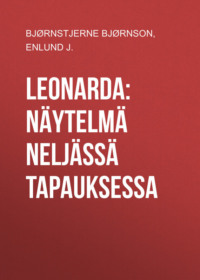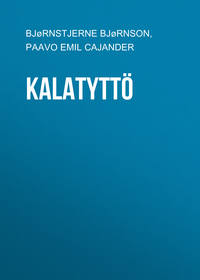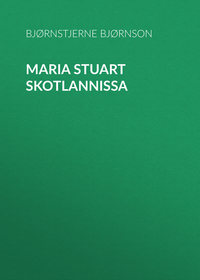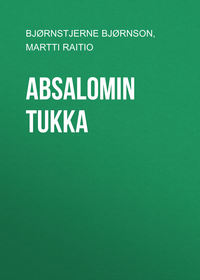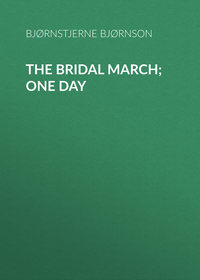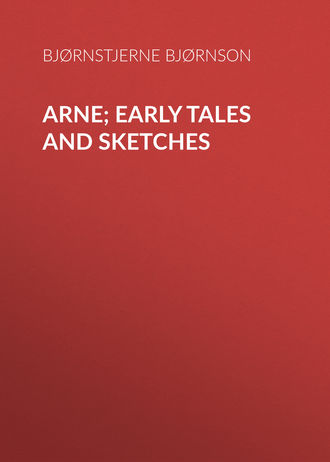 полная версия
полная версияArne; Early Tales and Sketches
"Wait a little, and take with you the smaller box he brought here with him."
And she went in to get it. But one of the men said, —
"He can have that," and he pointed at Thrond.
"Use it as well as he who is now lying here," added the other stranger, pointing at the large box.
Then they both laughed and went on. Thrond looked at the little box which thus came into his possession.
"What is there in it?" asked he.
"Carry it in and find out," said the mother.
He did as he was told, but his mother helped him open it. Then a great joy lighted up his face; for he saw something very light and fine lying there.
"Take it up," said his mother.
He put just one finger down on it, but quickly drew it back again, in great alarm.
"It cries," said he.
"Have courage," said his mother, and he grasped it with his whole hand and drew it forth from the box.
He weighed it and turned it round, he laughed and felt of it.
"Dear me! what is it?" asked he, for it was as light as a toy.
"It is a fiddle."
This was the way that Thrond Alfson got his first violin.
The father could play a little, and he taught the boy how to handle the instrument; the mother could sing the tunes she remembered from her dancing days, and these the boy learned, but soon began to make new ones for himself. He played all the time he was not at his books; he played until his father once told him he was fading away before his eyes. All the boy had read and heard until that time was put into the fiddle. The tender, delicate string was his mother; the one that lay close beside it, and always accompanied his mother, was Ragnhild. The coarse string, which he seldom ventured to play on, was his father. But of the last solemn string he was half afraid, and he gave no name to it. When he played a wrong note on the E string, it was the cat; but when he took a wrong note on his father's string, it was the ox. The bow was Blessom, who drove from Copenhagen to Vaage in one night. And every tune he played represented something. The one containing the long solemn tones was his mother in her black dress. The one that jerked and skipped was like Moses, who stuttered and smote the rock with his staff. The one that had to be played quietly, with the bow moving lightly over the strings, was the hulder in yonder fog, calling together her cattle, where no one but herself could see.
But the music wafted him onward over the mountains, and a great yearning took possession of his soul. One day when his father told about a little boy who had been playing at the fair and who had earned a great deal of money, Thrond waited for his mother in the kitchen and asked her softly if he could not go to the fair and play for people.
"Who ever heard of such a thing!" said his mother; but she immediately spoke to his father about it.
"He will get out into the world soon enough," answered the father; and he spoke in such a way that the mother did not ask again.
Shortly after this, the father and mother were talking at table about some new settlers who had recently moved up on the mountain and were about to be married. They had no fiddler for the wedding, the father said.
"Could not I be the fiddler?" whispered the boy, when he was alone in the kitchen once more with his mother.
"What, a little boy like you?" said she; but she went out to the barn where his father was and told him about it.
"He has never been in the parish," she added, "he has never seen a church."
"I should not think you would ask about such things," said Alf; but neither did he say anything more, and so the mother thought she had permission. Consequently she went over to the new settlers and offered the boy's services.
"The way he plays," said she, "no little boy has ever played before;" and the boy was to be allowed to come.
What joy there was at home! Thrond played from morning until evening and practiced new tunes; at night he dreamed about them: they bore him far over the hills, away to foreign lands, as though he were afloat on sailing clouds. His mother made a new suit of clothes for him; but his father would not take part in what was going on.
The last night he did not sleep, but thought out a new tune about the church which he had never seen. He was up early in the morning, and so was his mother, in order to get him his breakfast, but he could not eat. He put on his new clothes and took his fiddle in his hand, and it seemed to him as though a bright light were glowing before his eyes. His mother accompanied him out on the flag-stone, and stood watching him as he ascended the slopes; – it was the first time he had left home.
His father got quietly out of bed and walked to the window; he stood there following the boy with his eyes until he heard the mother out on the flag-stone, then he went back to bed and was lying down when she came in.
She kept stirring about him, as if she wanted to relieve her mind of something. And finally it came out: —
"I really think I must walk down to the church and see how things are going."
He made no reply, and therefore she considered the matter settled, dressed herself and started.
It was a glorious, sunny day, the boy walked rapidly onward; he listened to the song of the birds and saw the sun glittering among the foliage, while he proceeded on his way, with his fiddle under his arm. And when he reached the bride's house, he was still so occupied with his own thoughts, that he observed neither the bridal splendor nor the procession; he merely asked if they were about to start, and learned that they were. He walked on in advance with his fiddle, and he played the whole morning into it, and the tones he produced resounded through the trees.
"Will we soon see the church?" he asked over his shoulder.
For a long time he received only "No" for an answer, but at last some one said:
"As soon as you reach that crag yonder, you will see it."
He threw his newest tune into the fiddle, the bow danced on the strings, and he kept his eyes fixed intently before him. There lay the parish right in front of him!
The first thing he saw was a little light mist, curling like smoke on the opposite mountain side. His eyes wandered over the green meadow and the large houses, with windows which glistened beneath the scorching rays of the sun, like the glacier on a winter's day. The houses kept increasing in size, the windows in number, and here on one side of him lay the enormous red house, in front of which horses were tied; little children were playing on a hill, dogs were sitting watching them. But everywhere there penetrated a long, heavy tone, that shook him from head to foot, and everything he saw seemed to vibrate with that tone. Then suddenly he saw a large, straight house, with a tall, glittering staff reaching up to the skies. And below, a hundred windows blazed, so that the house seemed to be enveloped in flames. This must be the church, the boy thought, and the music must come from it! Round about stood a vast multitude of people, and they all looked alike! He put them forthwith into relations with the church, and thus acquired a respect mingled with awe for the smallest child he saw.
"Now I must play," thought Thrond, and tried to do so.
But what was this? The fiddle had no longer any sound in it. There must be some defect in the strings; he examined, but could find none.
"Then it must be because I do not press on hard enough," and he drew his bow with a firmer hand; but the fiddle seemed as if it were cracked.
He changed the tune that was meant to represent the church into another, but with equally bad results; no music was produced, only squeaking and wailing. He felt the cold sweat start out over his face, he thought of all these wise people who were standing here and perhaps laughing him to scorn, this boy who at home could play so beautifully but who here failed to bring out a single tone!
"Thank God that mother is not here to see my shame!" said he softly to himself, as he played among the people; but lo! there she stood, in her black dress, and she shrank farther and farther away.
At that moment he beheld far up on the spire, the black-haired man who had given him the fiddle. "Give it back to me," he now shouted, laughing and stretching out his arms, and the spire went up and down with him, up and down. But the boy took the fiddle under one arm, screaming, "You shall not have it!" and turning, ran away from the people, beyond the houses, onward through meadow and field, until his strength forsook him, and then sank to the ground.
There he lay for a long time, with his face toward the earth, and when finally he looked round he saw and heard only God's infinite blue sky that floated above him, with its everlasting sough. This was so terrible to him that he had to turn his face to the ground again. When he raised his head once more his eyes fell on his fiddle, which lay at his side.
"This is all your fault!" shouted the boy, and seized the instrument with the intention of dashing it to pieces, but hesitated as he looked at it.
"We have had many a happy hour together," said he, then paused. Presently he said: "The strings must be severed, for they are worthless." And he took out a knife and cut. "Oh!" cried the E string, in a short, pained tone. The boy cut. "Oh!" wailed the next; but the boy cut. "Oh!" said the third, mournfully; and he paused at the fourth. A sharp pain seized him; that fourth string, to which he never dared give a name, he did not cut. Now a feeling came over him that it was not the fault of the strings that he was unable to play, and just then he saw his mother walking slowly up the slope toward where he was lying, that she might take him home with her. A greater fright than ever overcame him; he held the fiddle by the severed strings, sprang to his feet, and shouted down to her, —
"No, mother! I will not go home again until I can play what I have seen to-day."
A DANGEROUS WOOING
When Aslaug had become a grown-up girl, there was not much peace to be had at Huseby; for there the finest boys in the parish quarreled and fought night after night. It was worst of all on Saturday nights; but then old Knud Huseby never went to bed without keeping his leather breeches on, nor without having a birch stick by his bedside.
"If I have a daughter, I shall look after her, too," said old Huseby.
Thore Næset was only a houseman's son; nevertheless there were those who said that he was the one who came oftenest to see the gardman's daughter at Huseby. Old Knud did not like this, and declared also that it was not true, "for he had never seen him there." But people smiled slyly among themselves, and thought that had he searched in the corners of the room instead of fighting with all those who were making a noise and uproar in the middle of the floor, he would have found Thore.
Spring came and Aslaug went to the sæter with the cattle. Then, when the day was warm down in the valley, and the mountain rose cool above the haze, and when the bells tinkled, the shepherd dog barked, and Aslaug sang and blew the loor on the mountain side, then the hearts of the young fellows who were at work down on the meadow would ache, and the first Saturday night they all started up to the mountain sæter, one faster than the other. But still more rapidly did they come down again, for behind the door at the sæter there stood one who received each of them as he came, and gave him so sound a whipping that he forever afterward remembered the threat that followed it, —
"Come again another time and you shall have some more."
According to what these young fellows knew, there was only one in the parish who could use his fists in this way, and that was Thore Næset. And these rich gardmen's sons thought it was a shame that this houseman's son should cut them all out at the Huseby sæter.
So thought, also, old Knud, when the matter reached his ears, and said, moreover, that if there was nobody else who could tackle Thore, then he and his sons would try it. Knud, it is true, was growing old, but although he was nearly sixty, he would at times have a wrestle or two with his eldest son, when it was too dull for him at some party or other.
Up to the Huseby sæter there was but one road, and that led straight through the gard. The next Saturday evening, as Thore was going to the sæter, and was stealing on his tiptoes across the yard, a man rushed right at his breast as he came near the barn.
"What do you want of me?" said Thore, and knocked his assailant flat on the ground.
"That you shall soon find out," said another fellow from behind, giving Thore a blow on the back of the head. This was the brother of the former assailant.
"Here comes the third," said old Knud, rushing forward to join the fray.
The danger made Thore stronger. He was as limber as a willow and his blows left their marks. He dodged from one side to the other. Where the blows fell he was not, and where his opponents least expected blows from him, they got them. He was, however, at last completely beaten; but old Knud frequently said afterwards that a stouter fellow he had scarcely ever tackled. The fight was continued until blood flowed, but then Huseby cried, —
"Stop!" and added, "If you can manage to get by the Huseby wolf and his cubs next Saturday night, the girl shall be yours."
Thore dragged himself homeward as best he could; and as soon as he got home he went to bed.
At Huseby there was much talk about the fight; but everybody said, —
"What did he want there?"
There was one, however, who did not say so, and that was Aslaug. She had expected Thore that Saturday night, and when she heard what had taken place between him and her father, she sat down and had a good cry, saying to herself, —
"If I cannot have Thore, there will never be another happy day for me in this world."
Thore had to keep his bed all day Sunday; and Monday, too, he felt that he must do the same. Tuesday came, and it was such a beautiful day. It had rained during the night. The mountain was wet and green. The fragrance of the leaves was wafted in through the open window; down the mountain sides came the sound of the cow-bells, and some one was heard singing up in the glen. Had it not been for his mother, who was sitting in the room, Thore would have wept from impatient vexation.
Wednesday came and still Thore was in bed; but on Thursday he began to wonder whether he could not get well by Saturday; and on Friday he rose. He remembered well the words Aslaug's father had spoken: "If you can manage to get by the Huseby wolf and his cubs next Saturday, the girl shall be yours." He looked over toward the Huseby sæter again and again. "I cannot get more than another thrashing," thought Thore.
Up to the Huseby sæter there was but one road, as before stated; but a clever fellow might manage to get there, even if he did not take the beaten track. If he rowed out on the fjord below, and past the little tongue of land yonder, and thus reached the other side of the mountain, he might contrive to climb it, though it was so steep that a goat could scarcely venture there – and a goat is not very apt to be timid in climbing the mountains, you know.
Saturday came, and Thore stayed without doors all day long. The sunlight played upon the foliage, and every now and then an alluring song was heard from the mountains. As evening drew near, and the mist was stealing up the slope, he was still sitting outside of the door. He looked up the mountain, and all was still. He looked over toward the Huseby gard. Then he pushed out his boat and rowed round the point of land.
Up at the sæter sat Aslaug, through with her day's work. She was thinking that Thore would not come this evening, but that there would come all the more in his stead. Presently she let loose the dog, but told no one whither she was going. She seated herself where she could look down into the valley; but a dense fog was rising, and, moreover, she felt little disposed to look down that way, for everything reminded her of what had occurred. So she moved, and without thinking what she was doing, she happened to go over to the other side of the mountain, and there she sat down and gazed out over the sea. There was so much peace in this far-reaching sea-view!
Then she felt like singing. She chose a song with long notes, and the music sounded far into the still night. She felt gladdened by it, and so she sang another verse. But then it seemed to her as if some one answered her from the glen far below. "Dear me, what can that be?" thought Aslaug. She went forward to the brink of the precipice, and threw her arms around a slender birch, which hung trembling over the steep. She looked down but saw nothing. The fjord lay silent and calm. Not even a bird ruffled its smooth surface. Aslaug sat down and began singing again. Then she was sure that some one responded with the same tune and nearer than the first time. "It must be somebody, after all." Aslaug sprang up and bent out over the brink of the steep; and there, down at the foot of a rocky wall, she saw a boat moored, and it was so far down that it appeared like a tiny shell. She looked a little farther up, and her eyes fell on a red cap, and under the cap she saw a young man, who was working his way up the almost perpendicular side of the mountain. "Dear me, who can that be?" asked Aslaug, as she let go of the birch and sprang far back.
She dared not answer her own question, for she knew very well who it was. She threw herself down on the greensward and took hold of the grass with both hands, as though it were she who must not let go her hold. But the grass came up by the roots.
She cried aloud and prayed God to help Thore. But then it struck her that this conduct of Thore's was really tempting God, and therefore no help could be expected.
"Just this once!" she implored.
And she threw her arms around the dog, as if it were Thore she were keeping from loosing his hold. She rolled over the grass with him, and the moments seemed years. But then the dog tore himself away. "Bow-bow," he barked over the brink of the steep and wagged his tail. "Bow-wow," he barked at Aslaug, and threw his forepaws up on her. "Bow-wow," over the precipice again; and a red cap appeared over the brow of the mountain and Thore lay in her arms.
Now when old Knud Huseby heard of this, he made a very sensible remark, for he said, —
"That boy is worth having; the girl shall be his."
THE BEAR HUNTER
A worse boy to tell lies than the priest's oldest son could scarcely be found in the whole parish; he was also a very good reader; there was no lack on that score, and what he read the peasants were glad to hear, but when it was something they were well pleased with, he would make up more of the same kind, as much as he thought they wanted. His own stories were mostly about strong men and about love.
Soon the priest noticed that the threshing up in the barn was being done in a more and more lazy manner; he went to see what the matter was, and behold it was Thorvald, who stood there telling stories. Soon the quantity of wood brought home from the forest became wonderfully small; he went to see what the trouble was, and there stood Thorvald again, telling stories. There must be an end to this, thought the priest; and he sent the boy to the nearest school.
Only peasant children attended this school, but the priest thought it would be too expensive to keep a private tutor for this one boy. But Thorvald had not been a week among the scholars, before one of his schoolmates came in pale as a corpse, and said he had met some of the underground folk coming along the road. Another boy, still paler, followed, and said that he had actually seen a man without a head walking about and moving the boats down by the landing-place. And what was worst of all, little Knud Pladsen and his young sister, one evening, as they were returning home from school, came running back, almost out of their senses, crying, and declaring that they had heard the bear up near the parsonage; nay, little Marit had even seen his gray eyes sparkle. But now the school-master got terribly angry, struck the table with his ferule, and asked what the deuce – God pardon me my wicked sin – had gotten into the school-children.
"One is growing more crazy than the other," said he. "There lurks a hulder in every bush; there sits a merman under every boat; the bear is out in midwinter! Have you no more faith in your God or in your catechism," quoth he, "or do you believe in all kinds of deviltry, and in all the terrible powers of darkness, and in bears roaming about in the middle of winter?"
But then he calmed down somewhat after a while, and asked little Marit whether she really did not dare to go home. The child sobbed and cried, and declared that it was utterly impossible. The school-master then said that Thorvald, who was the eldest of those remaining, should go with her through the wood.
"No, he has seen the bear himself," cried Marit; "it was he who told us about it."
Thorvald shrank within himself, where he was sitting, especially when the school-master looked at him and drew the ferule affectionately through his left hand.
"Have you seen the bear?" he asked, quietly.
"Well, at any rate, I know," said Thorvald, "that our overseer found a bear's den up in the priest's wood, the day he was out ptarmigan shooting."
"But have you seen the bear yourself?"
"It was not one, it was two large ones, and perhaps there were two smaller ones besides, as the old ones generally have their last year's cubs and this year's, too, with them."
"But have you seen them?" reiterated the school-master, still more mildly, as he kept drawing the ferule between his fingers.
Thorvald was silent for a moment.
"I saw the bear that Lars, the hunter, felled last year, at any rate."
Then the school-master came a step nearer, and asked, so pleasantly that the boy became frightened, —
"Have you seen the bears up in the parsonage wood, I ask?"
Thorvald did not say another word.
"Perhaps your memory did not serve you quite right this time?" said the school-master, taking the boy by the jacket collar and striking his own side with the ferule.
Thorvald did not say a word; the other children dared not look that way. Then the school-master said earnestly, —
"It is wicked for a priest's son to tell lies, and still more wicked to teach the poor peasant children to do such things."
And so the boy escaped for that time.
But the next day at school (the teacher had been called up to the priest's and the children were left to themselves) Marit was the first one to ask Thorvald to tell her something about the bear again.
"But you get so frightened," said he.
"Oh, I think I will have to stand it," said she, and moved closer to her brother.
"Ah, now you had better believe it will be shot!" said Thorvald, and nodded his head. "There has come a fellow to the parish who is able to shoot it. No sooner had Lars, the hunter, heard about the bear's den up in the parsonage wood, than he came running through seven whole parishes with a rifle as heavy as the upper mill-stone, and as long as from here to Hans Volden, who sits yonder."
"Mercy!" cried all the children.
"As long?" repeated Thorvald; "yes, it is certainly as long as from here to yonder bench."
"Have you seen it?" asked Ole Böen.
"Have I seen it, do you say? Why, I have been helping to clean it, and that is what Lars will not allow everybody to do, let me tell you. Of course I could not lift it, but that made no difference; I only cleaned the lock, and that is not the easiest work, I can tell you."
"People say that gun of Lars's has taken to missing its mark of late," said Hans Volden, leaning back, with both his feet on the desk. "Ever since that time when Lars shot, up at Osmark, at a bear that was asleep, it misses fire twice and misses the mark the third time."
"Yes, ever since he shot at a bear that was asleep," chimed in the girls.
"The fool!" added the boys.
"There is only one way in which this difficulty with the rifle can be remedied," said Ole Böen, "and that is to thrust a living snake down its barrel."
"Yes, we all know that," said the girls. They wanted to hear something new.
"It is now winter, and snakes are not to be found, and so Lars cannot depend very much upon his rifle," said Hans Volden, thoughtfully.


